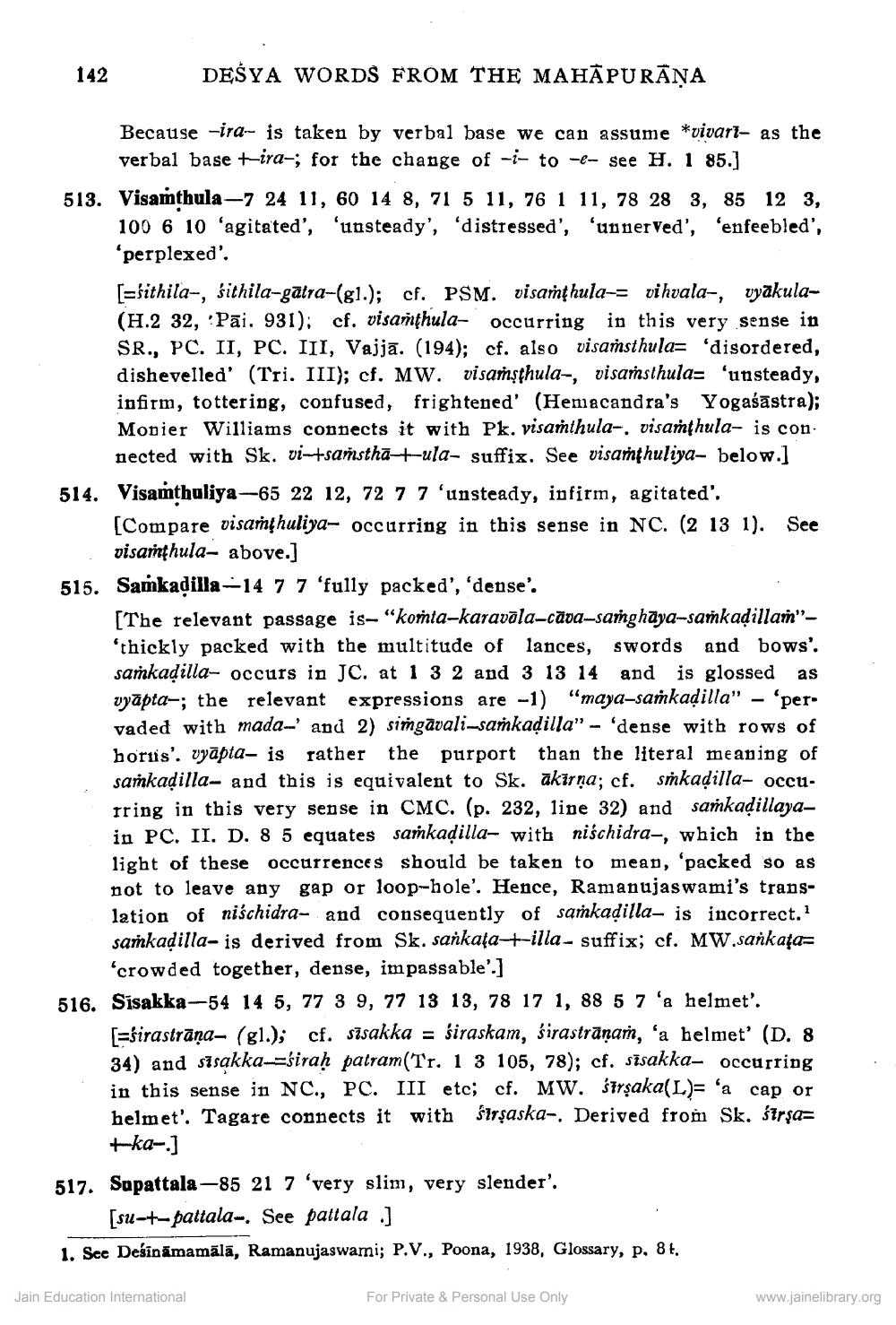________________
142
DEŠYA WORDS FROM THE MAHĀPURĀŅA
Because -ira- is taken by verbal base we can assume *vivari- as the verbal base +-ira-; for the change of -i- to -- see H. 1 85.]
513. Visamthula—7 24 11, 60 14 8, 71 5 11, 76 1 11, 78 28 3, 85 12 3,
100 6 10 'agitated', 'unsteady', 'distressed', 'unner Ved', 'enfeebled', 'perplexed'.
[=sithila-, śithila-gālra-(gl.); cf. PSM. visamthula-= vi hvala-, vyakula(H.2 32, Pāi. 931); cf. visamthula- occurring in this very sense in SR., PC. II, PC. III, Vajjā. (194); cf. also visařsthula= 'disordered, dishevelled' (Tri. III); cf. MW. visañşthula-, visansthula= 'unsteady, infirm, tottering, confused, frightened' (Hemacandra's Yogaśāstra); Monier Williams connects it with Pk. visamthula-, visamthula- is con.
nected with Sk. vi-tsanstha-t-ula- suffix. See visamthuliya- below.] 514. Visamtholiya--65 22 12, 72 7 7 'unsteady, infirm, agitated'.
[Compare visam huliya- occurring in this sense in NC. (2 13 1). See
visanthula, above.] 515. Samkadilla-14 7 7 'fully packed', 'dense'.
[The relevant passage is- "kosta-karavāla-cāva-samghaya-sařkadillam"'thickly packed with the multitude of lances, swords and bows'. saṁkadilla- occurs in JC. at 1 3 2 and 3 13 14 and is glossed as vyāpta-; the relevant expressions are -1) "maya-saħkadilla" - 'pervaded with mada- and 2) sigāvali-saṁkadilla" - 'dense with rows of horus'. vyāpta, is rather the purport than the literal meaning of sařkadilla- and this is equivalent to Sk. akirņa; cf. sĩkadilla- occuIring in this very sense in CMC. (p. 232, line 32) and sankadillayain PC. II. D. 8 5 equates samkadilla- with niśchidra-, which in the light of these occurrences should be taken to mean, 'packed so as not to leave any gap or loop-hole'. Hence, Ramanujaswami's translation of niśchidra- and consequently of sarkadilla, is incorrect. sarkadilla- is derived from Sk. sankata-t-illa- suffix; cf. MW.sankata=
'crowded together, dense, impassable'.] 516.
Sisakka-54 14 5, 77 3 9, 77 13 13, 78 17 1, 88 5 7 'a helmet. [=sirastrāņa- (gl.); cf. sāsakka = siraskam, śirastrānam, 'a helmet' (D. 8 34) and sisakka-=siraḥ patram(Tr. 1 3 105, 78); cf. sīsakka, occurring in this sense in NC., PC. III etc; cf. MW. Śtrşaka(L)= “a cap or helmet'. Tagare connects it with sirşaska-. Derived from Sk. śrşa= +ka-]
517. Sapattala-85 21 7 'very slim, very slender'.
[su-+-pattala-. See pattala ) 1. See Desīnāmamālā, Ramanujaswarni; P.V., Poona, 1938, Glossary, p. 8t.
Jain Education International
For Private & Personal Use Only
www.jainelibrary.org




